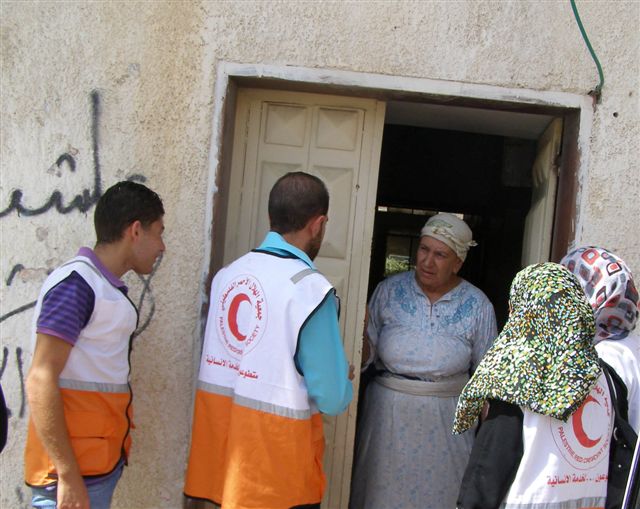
Al Bireh- “Every time my son fell, I would put some coffee on his wounds and I would cover his burns with toothpaste. That is until PRCS knocked on my door and gave me these leaflets”, said Umm Rami from Ittil village in Tulkarem Governorate. She was speaking about the “Door-to-door” campaign launched by PRCS to mark the World First Aid Day.
Umm Rami’s neighbors and many other housewives targeted by the campaign in Ittil used to do the same thing. But then, much to their surprise, PRCS EMTs and volunteers knocked on their doors and handed them some leaflets and brochures.
From Azzoun, Ittil, Jenin, Assira, Salfit, Al Jaftalak in the North, to Ni’ilin, Abou Diss and Battir in the Center, to Al Thahiriya in the South, PRCS teams toured West Bank towns and villages, raising awareness about First Aid under the banner “First Aid for All”.
The same happened in the Gaza Strip where ambulances toured streets and volunteers walked in alleys carrying First Aid booklets issued by PRCS’ EMS Department and entitled “The Basics of First Aid”.
The “Door-to-door” 20-day campaign which was launched on 20 September featured booklet distribution as well as a series of lectures with the participation of hundreds of housewives in targeted areas. The lectures covered the following issues, inter alia: An introduction to First Aid, bleeding, wounds, fractures, burns, poisoning, insect bites and sunburns.
Posters and banners were hung in streets calling on inhabitants to learn about First Aid, how to properly handle accidents and injuries, and how to avoid dangerous practices. Many of the participating housewives were surprised to learn that some of their usual practices were actually wrong, such as putting coffee on wounds or toothpaste on burns and holding the head up to stop nose bleeding.
Umm Rami (57), from the town’s Women Committee said: “We benefited tremendously from this campaign. Lectures were very useful and the information provided in booklets is valuable. I did not know much about First-Aid before today”.
Her neighbor Meriem Hafeth (45), added: “Everyone needs to know about First-Aid, especially housewives, because they are more accident prone, and also because they have to look after their children, husbands and homes. Prior to this campaign I did not know how to deal with nosebleeds, bleeding and burns. I value the role played by PRCS in order to enrich my knowledge as well as that of my friends, and also for focusing on us housewives”.
This campaign focused on housewives because PRCS believes in the role they play to enhance awareness and knowledge in various fields, and also because women sometimes have to deal with accidents requiring First-Aid.
According to Dr. Awada, Head of PRCS’ EMS Department, “ Housewives play a major role in enhancing awareness and knowledge among Palestinians, as they have a big influence on the lives of their children and husbands and have to deal with various issues on a daily basis. There are many wrong practices when accidents take place at home, in the street and everywhere which might unintentionally aggravate the patient’s condition. That is why First-Aid education is important to all of us”.
Tens of volunteers who took part in the campaign in the West Bank and the Gaza Strip were happy to play a role in raising the awareness of Palestinians about First-Aid.
Sabreen Al Khouzama, a volunteer who took part in this campaign alongside tens of her colleagues in Jenin said: “Some people were surprised to see volunteers and EMTs in the street, thinking something bad must have happened. They came to us to ask what was going on, which gave the campaign much more momentum. Some elderly housewives were astonished to see us at their doorsteps, bracing themselves for the worst and asking for God’s protection. But once we explained to them why we were there, they smiled, thanked us for our work and came to attend our lectures”.
Volunteer Sa’adat Amira, who took part in the campaign in Ni’lin, said: “This is one of the most valuable voluntary events I have taken part in. I can see the value of our work on people’s faces. Many housewives did not know how to handle injuries, and there are many things that I personally did not know. This campaign has benefited me personally and society in general”.
His colleague Ala’a Al Khawaja, who accompanied him on house tours during this campaign, added: “I was very keen on taking part in the Door-to-door campaign, ringing doorbells, distributing leaflets and encouraging women to attend our lectures. My strong desire to participate at the campaign was driven by the fact that it targeted housewives who need to learn how to handle injuries. I can now say that my own mother has become a very good paramedic at home”.
Within this campaign, around 500 women benefited from First-Aid lectures. Hundreds of others, who received home visits by EMTs and volunteers during the past 20 days, are now more First-Aid aware.